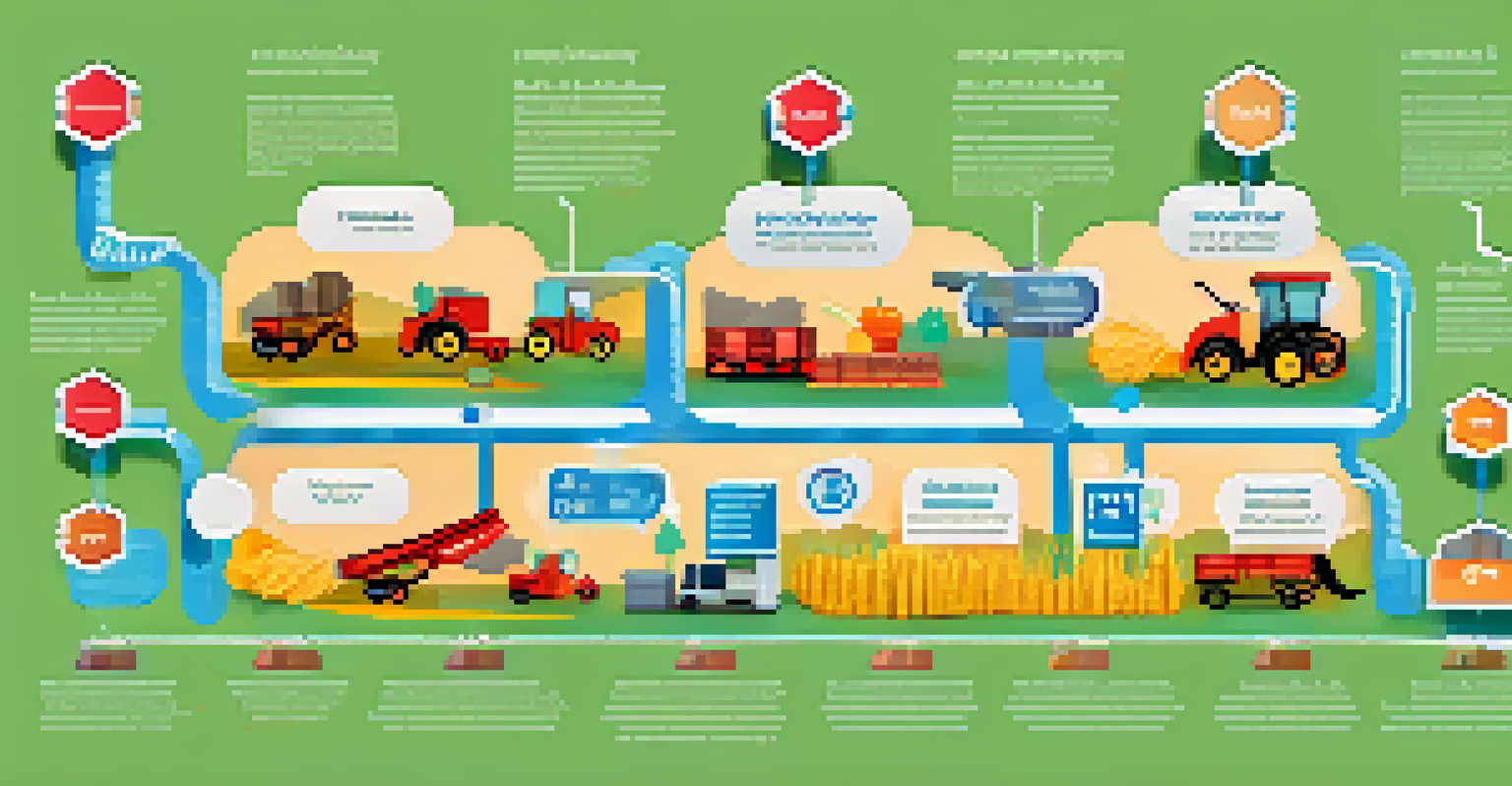The Role of Blockchain in Modernizing Supply Chain Practices

Understanding Blockchain and Its Core Principles
Blockchain is a decentralized digital ledger that records transactions across many computers securely. This technology ensures that the data cannot be altered retroactively without the alteration of all subsequent blocks, making it highly secure. Imagine a Google Doc that everyone can edit but no one can delete; that's a bit like how blockchain works.
Blockchain is the tech. Bitcoin is merely the first mainstream manifestation of its potential.
At its core, blockchain operates on principles of transparency, security, and decentralization. Every transaction is visible to all participants in the network, which builds trust among supply chain stakeholders. This means that instead of relying on a single authority, everyone has a copy of the ledger, enhancing accountability.
These core principles are vital for modernizing supply chains, which often struggle with transparency and data integrity. By utilizing blockchain, companies can create a more efficient system that reduces fraud and improves traceability of goods throughout the supply chain.
Enhancing Transparency in Supply Chains with Blockchain
One of the most significant benefits of blockchain in supply chains is its ability to provide transparency. Every transaction is recorded in a way that is publicly accessible to all participants, ensuring everyone is on the same page. This open access helps to eliminate the ‘black box’ nature of traditional supply chains.

For example, consumers can track the journey of their food from farm to table, verifying its origin and ensuring ethical practices. This transparency empowers consumers and builds trust between businesses and their customers. It also allows companies to quickly respond to any issues, such as recalls or supply disruptions.
Blockchain Boosts Supply Chain Transparency
Blockchain technology provides an open and accessible record of transactions, enhancing trust and accountability among all supply chain participants.
Moreover, enhanced transparency can lead to better collaboration between supply chain partners. When everyone has access to the same information, it facilitates smoother communication and helps in making informed decisions, ultimately leading to a more resilient supply chain.
Improving Traceability and Accountability in Transactions
Traceability is crucial in supply chains, especially for industries like food and pharmaceuticals where safety is paramount. Blockchain allows for real-time tracking of goods, providing a clear trail from origin to destination. This means that if something goes wrong, companies can quickly identify where the issue occurred.
The future of supply chains will be defined by transparency, trust, and technology.
For instance, if a batch of contaminated food is discovered, a blockchain system can pinpoint the exact source and track all affected products. This not only minimizes risks to consumers but also protects the brand's reputation. In a world where consumers demand safety, this level of accountability is invaluable.
Additionally, this traceability helps in compliance with regulatory standards. Companies can easily demonstrate that they are meeting safety and quality requirements, which can save time and resources during audits.
Reducing Costs and Increasing Efficiency in Operations
Implementing blockchain technology can lead to significant cost reductions in supply chain operations. By automating processes such as payments and record-keeping, businesses can cut down on administrative overhead and reduce the potential for human error. Imagine eliminating the need for multiple intermediaries; that’s what blockchain can facilitate.
Furthermore, blockchain's ability to streamline transactions means faster processing times. Traditional supply chain systems often involve lengthy paperwork and approvals, but with blockchain, transactions can occur in real-time. This efficiency can lead to quicker delivery times, enhancing customer satisfaction.
Real-Time Traceability Enhances Safety
The ability to track goods in real-time through blockchain allows companies to quickly identify issues and ensures consumer safety in industries like food and pharmaceuticals.
Ultimately, by reducing costs and increasing efficiency, businesses can allocate their resources more effectively. This not only boosts profitability but also allows companies to invest more in innovation and customer service.
Enhancing Security and Reducing Fraud Risks
Security is a top concern in supply chain management, as fraudulent activities can have devastating impacts. Blockchain enhances security by using cryptographic techniques that protect the data from unauthorized access. Think of it as a digital vault where only trusted parties can view the information.
Moreover, the decentralized nature of blockchain means that there is no single point of failure. In traditional systems, a breach in one area can compromise the entire network, but blockchain distributes the risk across multiple nodes. This makes it significantly harder for malicious actors to manipulate data.
By reducing fraud risks, businesses can maintain their integrity and build trust with their customers. This trust is essential for fostering long-term relationships and ensuring the smooth functioning of supply chains.
Facilitating Smart Contracts for Automated Processes
Smart contracts are self-executing contracts with the terms of the agreement directly written into code. In supply chains, these contracts can automate various processes, such as payment releases or inventory management, based on predetermined conditions. This not only saves time but also minimizes the need for intermediaries.
For example, a smart contract can be set to release payment automatically once goods are delivered and verified. This automation reduces delays and ensures that transactions are executed fairly and efficiently. It’s like having a digital butler that ensures everything runs smoothly without needing constant supervision.
Cost Savings Through Automation
By automating processes with blockchain, businesses can reduce administrative costs and improve efficiency, leading to faster transaction times and increased profitability.
By facilitating smart contracts, blockchain technology empowers businesses to focus on strategic initiatives rather than getting bogged down in administrative tasks. This shift can lead to more innovation and responsiveness in supply chain management.
Challenges of Implementing Blockchain in Supply Chains
While the benefits of blockchain are compelling, there are also challenges to its implementation in supply chains. One major hurdle is the initial cost and time associated with setting up the technology and training staff. Transitioning from traditional systems to blockchain can feel like learning to ride a bike for the first time—exciting but daunting.
Additionally, there’s the issue of interoperability between different blockchain systems. For a supply chain to function effectively, all stakeholders need to be on the same platform, which can be difficult if companies are using different technologies. Finding a common ground is essential for seamless integration.

Lastly, regulatory issues and data privacy concerns can pose significant barriers. As blockchain is relatively new, regulations are still catching up, and businesses must navigate these waters carefully to ensure compliance while leveraging the benefits of this innovative technology.
The Future of Supply Chains with Blockchain Technology
Looking ahead, the future of supply chains is poised to be transformed by blockchain technology. As businesses increasingly recognize the advantages, we can expect more widespread adoption across various industries. This could lead to a more interconnected and transparent global supply chain.
Moreover, advancements in blockchain technology, such as scalability solutions and enhanced user interfaces, will likely address many of the current challenges. As these improvements roll out, companies will find it easier to integrate blockchain into their existing systems, paving the way for innovation.
Ultimately, the integration of blockchain in supply chains not only enhances operational efficiency but also fosters a culture of trust and collaboration. This evolution will not only benefit businesses but also consumers, leading to a more sustainable and equitable marketplace.